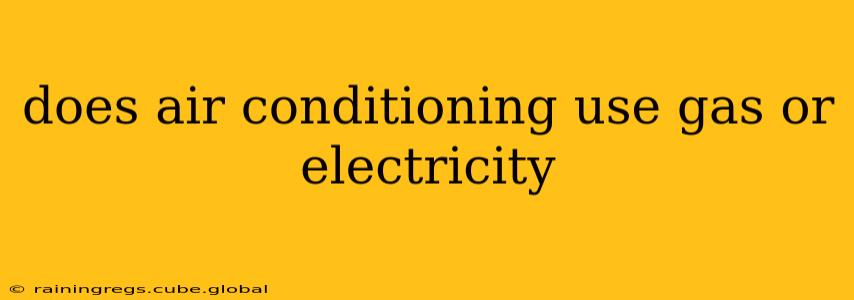Does Air Conditioning Use Gas or Electricity? Understanding AC Power Sources
Air conditioning systems primarily use electricity, but the story isn't quite that simple. While most residential and many commercial AC units run solely on electricity, some systems incorporate other energy sources, leading to common confusion. Let's break down the different possibilities.
What is the main power source for air conditioners?
The vast majority of air conditioners, whether window units, split systems, or central air conditioning, are powered by electricity. The electricity powers the compressor, fan motors, and other components necessary to cool the air. This electricity is drawn from your home's electrical grid.
Do any air conditioners use gas?
While electricity is the dominant power source, some air conditioning systems incorporate natural gas or propane. However, these aren't directly used to cool the air in the same way electricity is. Instead, they often power a heat pump system.
Heat pumps can provide both heating and cooling. In cooling mode, they still require electricity to operate the compressor and fans, but the gas is used to power a secondary heating element. This setup offers efficiency advantages in some situations, especially during colder months when supplemental heat is needed. These systems are less common in residential settings but more prevalent in larger commercial or industrial applications.
What are the different types of air conditioning systems and their power sources?
Several types of AC systems exist, and understanding their power sources is crucial:
- Window Air Conditioners: These typically run solely on electricity, drawing power directly from a wall outlet.
- Split System Air Conditioners: These comprise an outdoor unit (containing the compressor) and an indoor unit (handling air distribution). They also run primarily on electricity.
- Central Air Conditioning Systems: These are larger-scale systems that cool an entire house. They almost always run solely on electricity.
- Heat Pump Systems (with gas backup): As mentioned earlier, some heat pump systems utilize natural gas or propane for supplemental heating but still rely heavily on electricity for the cooling function.
Can I use a gas-powered generator to run my air conditioner during a power outage?
You can potentially use a gas-powered generator to run your air conditioner during a power outage, provided the generator is sufficiently powerful. However, this requires careful consideration of safety and proper installation by a qualified electrician. Connecting a generator incorrectly can be dangerous. Always consult a professional before attempting this.
What's more efficient: electric or gas air conditioning?
The efficiency of electric vs. gas air conditioning depends on several factors, including the specific system, climate, and energy costs in your region. In many situations, electric heat pumps can be more efficient than traditional gas-powered systems for cooling, particularly in milder climates. However, the most efficient option will vary depending on individual circumstances. Consulting with an HVAC professional can help you determine the best choice for your needs and location.
What is the cost difference between electric and gas air conditioning?
The initial cost of installation and the ongoing operational costs differ between electric and gas air conditioning. Gas systems typically involve higher initial installation costs due to the need for gas lines. Operational costs vary depending on the price of electricity and natural gas in your area.
In conclusion, while the overwhelming majority of air conditioners use electricity, some systems incorporate gas for supplemental heating within a heat pump configuration. Understanding the specific type of AC system and its power source is essential for proper installation, maintenance, and efficient operation. Always consult a qualified HVAC professional for advice tailored to your specific needs and location.
